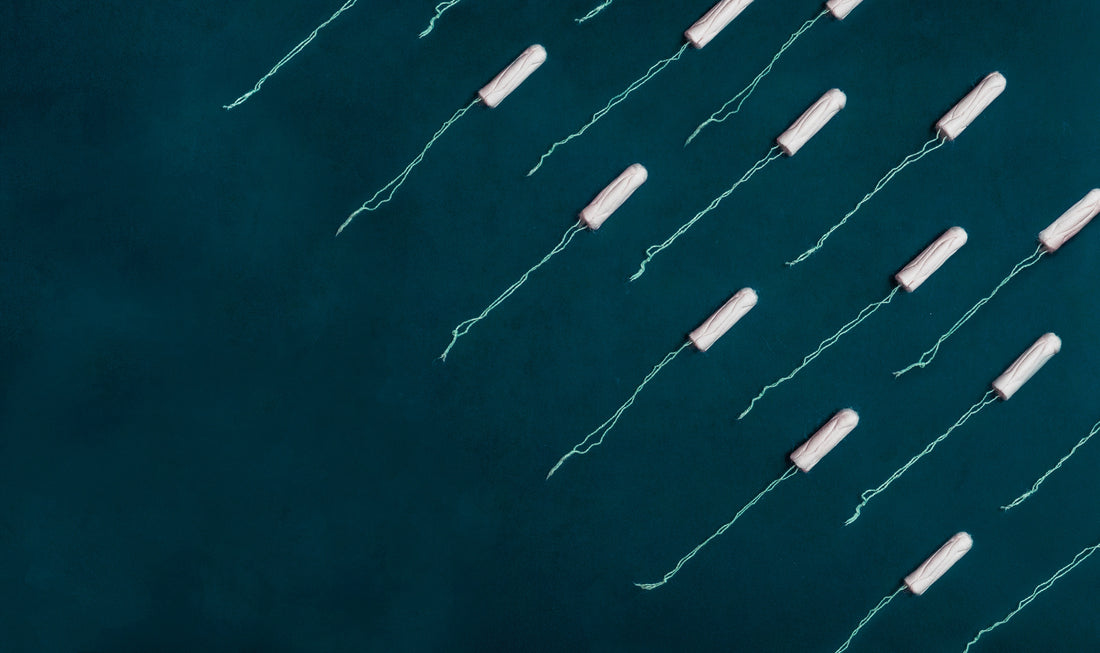
5 Benefits of Organic Tampons
Share
From organic makeup to organic deodorant, more and more health care products are becoming eco-conscious. And most recently, tampons have jumped on the bandwagon. You’re probably thinking: So, does that mean regular tampons are unsafe? What makes organic tampons different from conventional tampons?

The Problem with Conventional Tampons
Most tampons are made from cotton, and while most people think cotton is an all-natural fiber, it is often produced with pesticides, fertilizers and more harmful chemicals. Some of these substances include:
Rayon
Rayon is found in most conventional tampons, which is highly absorbent – so much so that it can dry out the mucous lining that protects the vagina.
Dioxins
These environmental pollutants are found in the air, soil and water. And while the FDA claims that the levels of dioxins in tampons are low and don’t pose a serious health threat, many doctors are concerned about the cumulative effect and long-term impact on our health.
“Dioxins are highly toxic and can cause cancer, reproductive and developmental problems, damage to the immune system, and can interfere with hormones,” The Environmental Protection Agency (EPA) reports.
Polyethylene (PET)
PET is used to create plastic, which can contaminate your body with dangerous substances such as mercury or lead. If you’re advised to use glass water bottles, you can imagine the problem with putting plastic in the most sensitive part of your body.
Glyphosate
This herbicide is used as a weed killer, and overexposure is linked to cancer. One study reports 85 percent of tampons contain glyphosate! Yikes.
Polypropylene
Polypropylene is used in antifreeze products…enough said.
In addition, with conventional tampons there is an increased risk for developing toxic shock syndrome (TSS). According to research conducted at New York University Medical School, the use of 100% cotton tampons reduces the risk of TSS compared to tampons that are a blend of cotton and rayon. Unlike the organic tampons, tampons that contained rayon produced the bacteria that causes TSS.

In an interview with The Guardian, Dr. Phillip Tierno, lead researcher of TSS and professor at NYU Medical School, he says, “the bottom line is that you can get TSS with synthetic tampons, but not with an all-cotton tampon.”
Tierno explains, "Never use tampons if you have ever had TSS. Use all-cotton products, don't use higher absorbencies and don't leave a tampon in for longer than eight hours. Above all, you are the proponent of your own health - do your bit by raising your brand of tampons as a concern with your doctor."
And let’s not forget the damaging environmental effect of plastic feminine hygiene products. The average woman uses 9,600 tampons over her lifetime…so, you do the math.
While plastic may be convenient and cheap to produce, it’s often not recycled. In fact, studies show by 2050 the amount of plastic in the ocean will be greater than the number of fish!
How to Avoid Toxic Tampons
The next time you’re shopping for tampons don’t be fooled by products that say “organic.” That doesn’t necessarily mean chemical-free. Look for USDA organic certifications such as the Global Organic Textile Standard and Quality Assurance International.
5 Benefits of Organic Tampons
Now that you’re aware of the health risks posed by conventional tampons, here are five reasons why you should make the switch to organic.

As mentioned above, name brand tampons are filled with a variety of harmful chemicals – some of which linked to severe health problems.
“The herbicide and pesticide residues that studies have detected in conventional cotton have been linked to cancer, endocrine disruption, and infertility,” says Molly Hayward, CEO of Cora Organic Tampons. “The synthetics used have been studied and found to have a link to a higher incidence of Toxic Shock Syndrome.”
To all the ladies with sensitive skin: Conventional tampons also contain unknown fragrances, which can be irritating. So, if you’ve been itching down there, your scented tampon may be to blame. However, it’s important to note that itching is a common symptom of numerous vaginal infections so if you’re itching continues, it’s best to consult with your gynecologist to find out what’s causing it.

Organic tampons are chemical- free and fragrance-free. Women who have switched to organic report that they experience less itching and irritation.
Did you know approximately 20 billion tampons, pads and applicators are dumped into North American landfills every year?
When tampons are made from 100% organic cotton, they decompose faster – making them safer not only for your health, but also for the environment.
So, at this point you may be thinking it’s great that organic tampons are safe and non-toxic, but how well they work?
Organic tampons are just as effective as conventional tampons in terms of absorbency, strength and durability.
As an added bonus, organic cotton is more comfortable than the synthetic material of name brand tampons.
“Organic cotton products have a natural softness which is not present in synthetic fabric. It is extremely comfortable to wear in the delicate vaginal and vulval areas,” says Gynecologist, Anne Henderson. “Organic cotton is both highly absorbent and breathable and keeps the delicate skin drier and free from irritation than synthetic alternatives.”

Unlike name brand tampons, organic tampons list all of the ingredients. By going organic, you can be confident that you are making the healthier choice for yourself and the environment!
Ever tried organic tampons? Have you noticed a difference? Feel free to share your thoughts below!